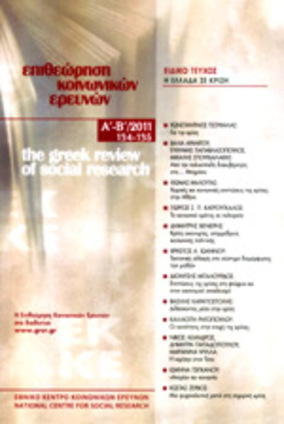Transnational intergration and national disitegration : regional underdevelopment and spatial imbalance in Greek society
Part of : Επιθεώρηση κοινωνικών ερευνών ; Vol.38, 1980, pages 121-140
Issue:
Pages:
121-140
Section Title:
Articles
Abstract:
An attempt has been made to demonstrate that Greek space ischaracterised by an inter sectoral, inter regional and intra-regionalduality as well as by a highly disintegrated economic structure. Theabove evidence was used to contest the assumptions of the classicallocation theories of Weber, Isard, Christaller, Lösch and Alonso, whoemphasised the existence of a homogeneous and balanceddistribution of physical and human resources in space; and theassumptions of the theory of inter\regional flows of factormovements of Lutz and Richardson, who attributed to these flowsvirtuous effects in relation to inter regional imbalance.A further conclusion drawn from the historical development of theGreek socio-economic spatial structure was that until 1922 therewere no definite national boundaries. Consequently, the conventionaldisequilibrium models of regional distribution of resources,which tend to abstract national space from the wider internationalcontext, would impede identification of the relation between what wehave called transnational integration, national and regionaldisintegration of socio-economic structures in Greece. For suchreasons it was claimed that the models of centre-periphery anddependency theories, suggested by Friedmann, Frank, Amin andSunkel, would prove more relevant for analysing Greek soci»economic space.By employing these models, we have demonstrated that urban andregional polarisation in the modern Greek State was caused by a newsystem of authority-dependency relations which was grafted onto apre-capitalist «traditional» system of society, and which radicallytransformed the spatial organization of the existing urban system.The new national élites, in close partnership with foreign capital,amassed a growing proportion of the nation’s wealth. Moreover, thenew import-substitution industrialisation policies implemented by theélites contributed to the growing primacy of the Athens region,where processes of «circular and cumulative causation» sustained acceleratedgrowth. Thus, a vicious circle of cumulative disequilibriumwas set in motion, which produced a type of urbanisaton without industrialisationwith its concomitant phenomena of «involution» and«ruralisation».The conclusions of our research pointed to a structuralheterogeneity that suggests five different levels of technology,organization and social relationships within the major economic sectorsof Greece's socio-economic formation.
Subject:
Subject (LC):




